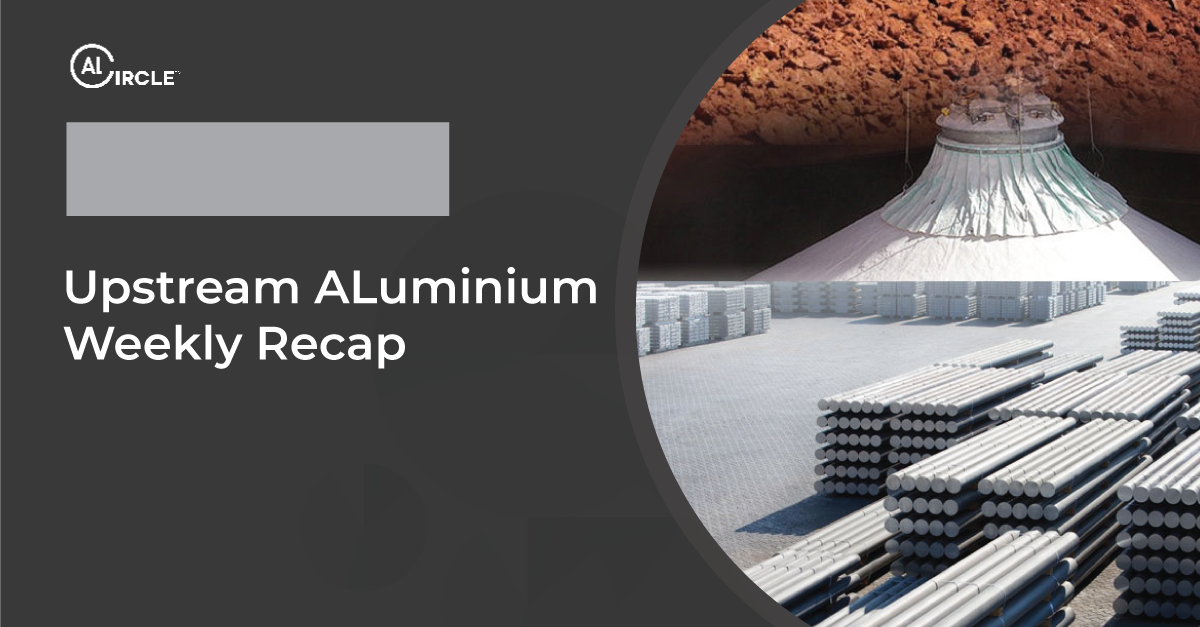您想继续阅读英文文章还
是切换到中文?
是切换到中文?

THINK ALUMINIUM THINK AL CIRCLE

Price, policy, and projects – the three Ps - have defined the pulse of the global upstream aluminium industry this week. The sector has been abuzz with record-high prices on the London Metal Exchange, strategic investments in bauxite projects, and reports of a potential full-scale restart of a major US-based smelter. Adding to the flurry, strategic acquisition involving a Brazil-headquartered firm has further intensified the global dynamics of the upstream industry. Meanwhile, renewed discussions among world leaders on bilateral trade measures like tariffs and free trade agreement have made this week the most consequential for the industry.
Upstream Weekly by AL Circle Pvt Ltd
{alcircleadd}Price & production
On Thursday, October 9, the LME aluminium benchmark price hit a record-high of the year, reaching USD 2,786.50 per tonne. Overnight, the price grew by USD 36 per tonne or 1.3 per cent from USD 2,750.50 per tonne, while over a month, it surged by 6.31 per cent from USD 2,621 per tonne. On the other hand, the opening stock gained a modest volume of 2,200 tonnes over a day, reaching 508,600 tonnes. This indicates supply concerns, driven by production caps in China coupled with strong demand in the market, especially from green industries like electric vehicles. Read here to learn more about the price movement.
Persistent supply chain concerns owing to growing demand in tandem with improved industrial operating rates also drove up aluminium prices by 0.64 per cent to INR 261.35 (USD 2.94). According to data published by the World Bureau of Metal Statistics (WBMS), the global aluminium market recorded a deficit of 119,900 tonnes in July and nearly 985,300 tonnes between January and July 2025. From a technical perspective, aluminium remains under the fresh buying pressures with open interest rising by 2.55 per cent to 4590 lots. Learn more about the price movement here.
Also read: Fastmarkets proposes CBAM cost integration into aluminium P1020A premiums
Supply concerns stem from sluggish aluminium output in many regions across the world due to soaring energy costs. Oceania, which is one of the notable alumina and primary aluminium producers, has also been experiencing slower output due to factors like aging infrastructure and energy cost pressures. From January to June 2025, Oceania produced 923 thousand tonnes of aluminium, down 1.8 per cent from 940 thousand tonnes in the same period of 2024 and slightly below 929 thousand tonnes in 2023. Similarly, its alumina output in H1 2025 declined 2.4 per cent Y-o-Y from 8.68 million tonnes to 8.47 million tonnes. Compared to H1 2023, the output this year plunged by 7.8 per cent from 9.19 million tonnes. To know more about the upstream alumina market in Oceania, click here.

Policies in place
Policies have always been the deciding factor of trade and market dynamics of any metal industries, including aluminium. Currently, they are playing more critical role than ever before with steep US tariffs in place and trade restrictions being implemented by many other countries on each other. Needless to say, rounds of discussions and talks between the countries have thus become a common event in recent times. Most recently, Canadian Prime Minister Mark Carney and the US President Donald Trump picked discussions focusing on tariffs and trade. The US tariff measures have really shaken up steel and aluminium exports, leading to significant job losses in manufacturing, brought forth the Canadian Prime Minister. To unveil the outcome of the meeting, read the full story here.
Meanwhile, amid trade restrictions, there’s an update on export suspension. According to a report on October 9, Argentina’s government has suspended export taxes on aluminium, steel and related products from Wednesday to boost export competitiveness and stimulate industrial output. The policy, effective until 31 December 2025, applies only to destinations where import tariffs are at least 45 per cent. It reflects Argentina’s intent to liberalise trade amid domestic economic challenges. Read the full story here.
Mutual talks on free trade agreements also rolled out this week as India and the European Union met in Brussel. This was the fourteenth round of talks as earlier thirteen failed to reach the ultimate goal, bringing a mutual consent over certain issues between the two countries. One issue that hinders the free trade agreement between India and the EU is certainly CBAM, which is designed to slap a 30 per cent duty on carbon-intensive products, including aluminium and steel. India as a significant supplier of the metals is striving to reach an agreement with the EU, and the latter’s Ambassador Herve Delphin has assured that the bloc is committed to delivering a mutually beneficial deal, noting that the EU-India trade partnership holds critical importance. Know here the other challenges India and the EU are trying to sort out for reaching the significant milestone - FTA.
Strategic decisions by giants
Investment into raw material
The foundation of primary aluminium is largely dependent on its raw materials. ABx group has secured USD 2.7 million of funding from Good Importing International (GII) to accelerate its Sunrise Bauxite Project in Queensland. The funding by GII marks a strategic partnership that is directed to fast-track the development and positioning of the Sunrise Bauxite project for near-term production.
Global mining firm Rio Tinto has opened full-scope expressions of interest (EOIs) for three key work packages for its Kangwinan Project, part of a major expansion of bauxite operations on Cape York Peninsula. The EOIs, available from October 13, will cover the concrete batch plant, site survey services, and the supply of quarry materials, marking a key milestone in advancing the project to its next phase.
Responses








